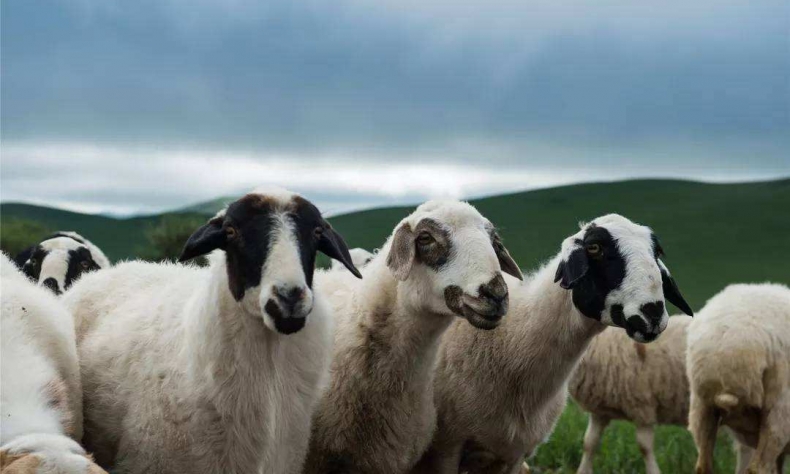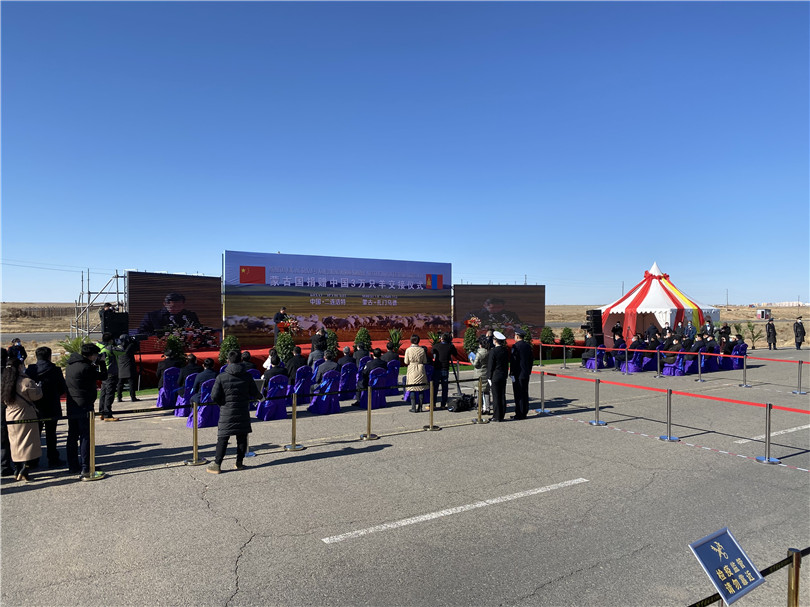The Gift of 30,000 Sheep Opens New Doors in Mongolia-China Relations

The gift of 30,000 sheep fully reflects the deep friendship of the Mongolian people towards the Chinese people.
On October 22, a ceremony was held to hand over the 4,000 sheep donated by Mongolian people to the Chinese people at the border region of Zamiin-Uud-Erlian. The first batch of sheep entered China, eight months after Mongolian President Khaltmaa Battulga handed over the certification of the gift of 30,000 sheep to Chinese President Xi Jinping to help China fight against the COVID-19 pandemic. Following the visit, two sides have agreed with organizing the handover ceremony of 30,000 sheep after the COVID-19 pandemic calms down and the sheep fully gain weight in autumn time.
During the ceremony Tumen Tegshjargal, Mongolian President’s Foreign Policy Advisor said, “It is an event that expresses the warmth of the Mongolian people to the Chinese people and brings a positive atmosphere to the relations between the two peoples.” While Chai Wenrui, Ambassador of China to Mongolia, who speaks Mongolian very well, said, “Chinese people will not forget this friendship of the Mongolian people. China and Mongolia have a long history of friendly neighbors linked by waters and mountains. The fact that we have understood and helped each other in our fight against the disease reflects the deep idea of Mongolian old proverb that the lives and spirits of neighbors are the same.”

Sheep diplomacy
During his visit last February, President of Mongolia Battulga was warmly welcomed by his Chinese counterpart Xi Jinping as the first foreign state leader to visit China since the outbreak of COVID-19. The visit and the donation of sheep by the Mongolian President reminded of ancient traditions and expressed Mongolian people’s support to the Chinese people to overcome hardship. All has become a significant event today.
The gift of 30,000 sheep is expressing special considerations and friendship. Traditionally Mongolians believed that sheep are warm-blooded animals and the first choice for giving gifts, which also implied sincerity and enthusiasm. Also, mutton is the best recipe for enhancing immunity and hopes that the Chinese people can overcome the epidemic situation as soon as possible. It can be said that this gift fully reflects the deep friendship of the Mongolian people towards the Chinese people.
Mongolians say, “A needle in need is of greater use than a camel in prosperity” as it implies “adversity reveals the quality of friendship”. In response to the remarks made by the President of Mongolia during his visit, President Xi also quoted ancient Chinese proverbs. He said that “If you have received a drop of beneficence from other people, you should return to them a fountain of beneficence,” with credit to Confucius.
As such, both sides concluded that the meeting, having taken place at a time of the novel coronavirus outbreak in China and an ongoing nationwide fight against it, is a proof that the Comprehensive Strategic Partnership between the two countries has reached a new height and the demonstration of ideal cooperation between neighboring countries to the world.
The Chinese public also expressed particular gratitude for Mongolians’ donation of 30,000 sheep. The topic “Mongolian President donated 30,000 sheep to China” received more than 100 million views on the Chinese social media platform, Sina Weibo.
Experts believe the “sheep diplomacy” has helped solidify the strategic partnership between the two countries, improve political and economic relations, and deepen mutual understanding between the Chinese and Mongolian people. International affairs expert and former Mongolian diplomat Dashdorj Bayarkhuu considered this visit as a “diplomatic victory for a small state” and a “smart move to promote Mongolia’s positive image to the Chinese people”. Another Mongolian independent international affair researcher Luguusharav Byambakhand sees this visit as a “soft power policy success for Mongolia in winning over the hearts and minds of the Chinese”.
Opportunity to increase trade
The gift of 30,000 sheep is also expressing that Chinese market is in Mongolia’s economic interest, which takes almost 90 percent of its exports, mostly coal and copper. Thus, the spread of COVID-19 in China posed particular challenges to the country. Mongolia has had to prevent the pandemic from spreading within its territory while at the same time keeping its economy afloat. During the spread of the coronavirus, the export of commodities to China, Mongolia’s main source of revenue, was severely disrupted. But just after the visit of President Battulga, the coal transportation resumed with additional precautionary measures for ensuring the health of Mongolian truck drivers entering China.
China and Mongolia are aiming for trade to reach $10 billion this year. Trade volume between Mongolia and China reached $8.9 billion in 2019, accounting for 64.4 percent of Mongolia’s total foreign trade, according to Mongolian National Statistics Office.
In the coming years, Mongolia aims to increase the export of many sectors to China – primarily its livestock. According to the livestock census conducted in 2019, heads of livestock animals in Mongolia totaled 70.9 million. Mongolia has the potential to export 6 to 7 million livestock or 174,000 tons of meat annually. However, due to the animal hygiene system not well-developed and China’s requirement of border customs regulations, not enough meat can be exported to its southern neighbor. Currently, China only imports frozen horse meat and a small amount of heat-processed beef from Mongolia. In 2019, Mongolia exported a total of 58,000 tons of meat, of which 30,300 tons was exported to China. Mongolia had set a goal of exporting a total of 7 million tons of meat for more than 15 countries in 2020, but due to the pandemic of the coronavirus, strategic food exports were suspended in the first half of the year.
The Government of Mongolia has identified agriculture as one of the pillars of Mongolia’s economic development and aims to become a “food exporter”. Chinese President Xi Jinping addressed the second China International Import Expo in Shanghai last year and stated that going forward China will give greater importance to imports. Meanwhile, Mongolia is keen to take advantage of China’s opening-up policies and increase their country’s exports to its southern neighbor.
The sheep had been collected from herders in three eastern and southern provinces of Mongolia – Khentii, Sukhbaatar, and Dornogobi and each one of them went under thorough veterinary examination. Officials said that by the middle of November, the handover of the 30, 000 sheep will be concluded. The fact that Mongolia has successfully transferred 30,000 sheep to China for the first time, indicates the potential for further supply of mutton to China and meat export increase.
Sarangua Tumur is a Mongolian freelancer for China Focus.
 Facebook
Facebook
 Twitter
Twitter
 Linkedin
Linkedin
 Google +
Google +










